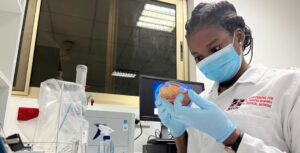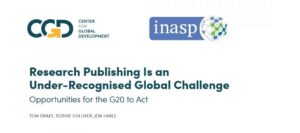Research in Sri Lanka suggests link between family history and higher risk of violence in bipolar patients
A large population worldwide is affected by bipolar disorder and the heritability stands at around 80%.
A recent medical research published in Sri Lanka Journal of Psychiatry, which is available on the Sri Lanka Journals Online platform supported by INASP, has assessed the association between family history of bipolar disorder and the risk of violence among patients admitted to the hospital for mania.
The study found a strong correlation between family history and risk of violence.
“Patients with a family history of bipolar disorder were significantly more likely to engage in violence than those without family history,” says the lead author of the article Dr Miyuru Chandradasa, of the Department of Psychiatry at University of Kelaniya, Sri Lanka. “The findings will be helpful in better allocation of resources in hospital wards as patients who are more likely to be violent can be identified at the time of admission and nursing and other care can be arranged for.”
According to Dr Chandradasa, “Bipolar spectrum disorders affect about 4.5% of the general population. It is a mood disorder marked by alternate depressive and manic episodes. During depressive episodes, patients may have low energy, feel lethargic and suicidal while during manic episodes, they may have high energy and be very active”.
The risk of violence to others occurs mostly during the manic episodes.
Dr Chandradasa, along with Dr Layani Champika from the Teaching Hospital Peradeniya, Kandy, and Dr Thilini Rajapakse of the Department of Psychiatry at University of Peradeniya, conducted the study with patients admitted at two tertiary hospitals in Kandy for treatment of bipolar disorder over a period of six months. A total of 148 patients were included in the study, of which 74 had a family history of bipolar disorder and the other 74 did not have a family history of bipolar disorder. All 148 patients were assessed for risk of violence at the time of admission and at weekly intervals after that, using the Historical, Clinical, Risk Management Scale-20 (HCR-20) by a researcher who was unaware of the family history status of the patients.
The assessment showed that participants with a positive family history of bipolar disorder had significantly higher risk of violence compared to participants with a negative family history.
However, significantly higher rates of unemployment, harmful use of alcohol and absence of confiding relationships were also found in participants with a positive family history. Therefore it could not be established whether the high rate of violence among patients with family history was associated with genetic factors or other causes like alcohol abuse.
“Although we planned to conduct the study as a cohort, we could not continue the cohort as patients did not come for follow up after they were discharged, a behaviour seen among many patients in developing countries,” said Dr Chandradasa. “We plan to conduct community-based research on the same topic so that we will have a clearer understanding as hospital-based research has many limitations.”
The article titled “Association of family history of bipolar disorder with risk of violence in inpatient mania: A cohort study” appears on the latest volume (7(2): 12-15, December of Sri Lanka Journal of Psychiatry. The journal and the article are made available online on SLJOL supported by INASP.
About the Journal
The Sri Lanka Journal of Psychiatry is the official publication of the Sri Lanka College of Psychiatrists. The journal aims to educate and stimulate discussion regarding nature, causes and treatment of mental illness, development of psychiatric services, prevention of mental illness, promotion of mental health and health professional education.
About SLJOL
Sri Lanka Journals Online (SLJOL), a part of INASP’s Journals Online, is a database of journals published in Sri Lanka, covering the full range of academic disciplines. The objective of SLJOL is to give greater visibility to the participating journals and to the research they convey. It is managed by the National Science Foundation of Sri Lanka and was developed in collaboration with INASP.
There are now 69 journals on SLJOL listing 7622 articles.
About INASP
Founded in 1992, INASP is an international development organization working with a global network of partners in Africa, Latin America and Asia. In line with the vision of research and knowledge at the heart of development, INASP works to support individuals and institutions to produce, share and use research and knowledge, which can transform lives.
INASP’s approaches are based on the core pillars of capacity development, convening, influencing and working in partnership. INASP promotes equity by actively addressing the needs of both men and women across all our work and addressing issues of power within the research and knowledge system. INASP has projects in 28 countries, supporting all aspects of research and knowledge systems, from facilitating the provision of information to researchers to helping parliamentarians and civil servants to use research and evidence in policy making.
Disclaimer: Research published in journals hosted on the SLJOL platform is selected by the journals in accordance with their own editorial processes and criteria. INASP and the National Science Foundation of Sri Lanka provide hosting and guidance on good practices but are not involved in selection of research.
For further information
Thakur Amgai, Communications Consultant, INASP
Email: tamgai@inasp.info
Dr Sangita Shrestha, Communications Officer, INASP
Email: sshrestha@inasp.info

 Previous Post
Previous Post Next Post
Next Post


